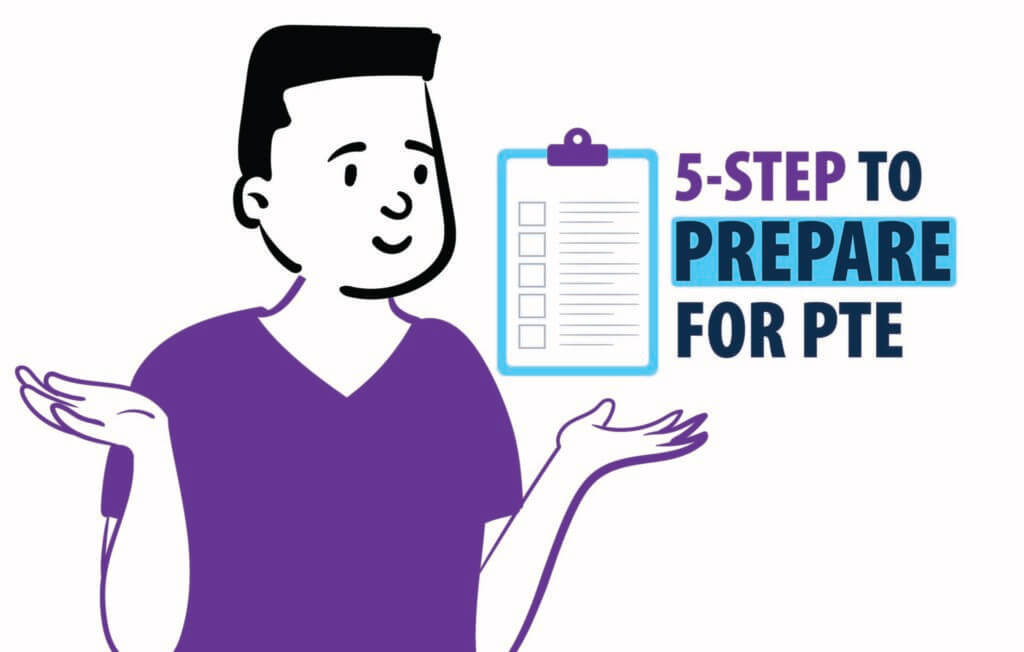If you’re new to PTE or to English proficiency tests, the preparation journey can seem overwhelming. These 5 PTE guidelines will help you plan how much to prepare, and what to prepare for.
Having a hard time learning a new language is common. But remember APICAL is always here to assist with your PTE preparation. APICAL will provide you with all kinds of materials to make your PTE journey smooth.
1. Know your current English proficiency level
Understanding your present English proficiency level in relation to the PTE score you need to get is a smart place to start. PTE allows you to assess your competency in communicative abilities (listening, reading, speaking, and writing).
2. Understand the PTE format
Spend some time getting to know the PTE Academic structure. Understanding its framework and the types of questions to expect is critical to achieving a better score 
PTE has 3 parts
Part 1: Speaking and Writing
Part 2: Reading
Part 3: Listening
These three parts include a total of 20 topics.
3. Understand the scoring system
PTE Academic questions are all machine-scored, which means that each exam is marked accurately, consistently, and fairly. Each test taker is assigned a score between 10 and 90 to indicate their level of English proficiency.
Scores for some questions are based on
Formal aspects: It refers to the form of your response. Whether your response is significantly over or under the word limit for a particular item type.
Quality: Your response’s quality comprises your strengths in areas such as oral fluency, pronunciation, and comprehension. This set of abilities is known as a ‘Skills Profile.’
Your Score Report contains the following sections:
- Overall score – This is your main PTE Academic score, graded between 10 and 90.
- Communicative Skills – These are the scores you achieved for your proficiency in each of the skills for speaking, writing, reading, and listening. Each skill is also graded between 10 and 90.
- Skills Profile – This shows how you performed across eight language skill categories, such as ‘Short Writing’ ‘Multiple-skills comprehension’, and ‘Open Response Speaking and Writing’. Each category has a progress bar to show how well you did.
Read more to understand PTE Scoring matrix: https://blog.apical.io/pte-scoring-matrix/
4. Fix the Practice time
Make the most of those spare minutes to practice your skills:
- Complete short, 5-10 minute practice activities each day to maintain and build your knowledge.
- Practice speaking English at your home, school or workplace.
- Join English-speaking groups. They offer the opportunity to practice both speaking and listening skills.
- Take every opportunity to write in English. For example, sending emails to friends or contacts, or keeping a journal.
- Read widely from sources like newspapers, magazines, academic journals, and books.
- Listen to English-speaking media, like television (use English subtitles if available) and radio broadcasts.
- Observe native speakers and listen to the language used in different contexts.
5. Tips for test day
- Read all test instructions carefully.
- Use correct punctuation for writing tasks: full stops, capital letters, commas, etc.
- Answer the question. If the question asks you to write or speak about sport, write or speak about ‘sport’ NOT ‘science’.
- Keep strictly within the word limit you are given for writing tasks.
- Respond quickly and keep speaking during speaking tasks. The microphone will close after three seconds of silence and will stop recording.
- Do not spend too much time on a single question.
- Spend any remaining time available to check your answers.
You need to practice very frequently to do better in PTE exam. Apical LMS has the next-generation speech recognition technology to help students develop their skills. Practice all PTE 20 topics in Apical LMS. Apical is continuously improving the LMS, so that students can confidently practice on our Practice Portal to assess their preparation and progress.






